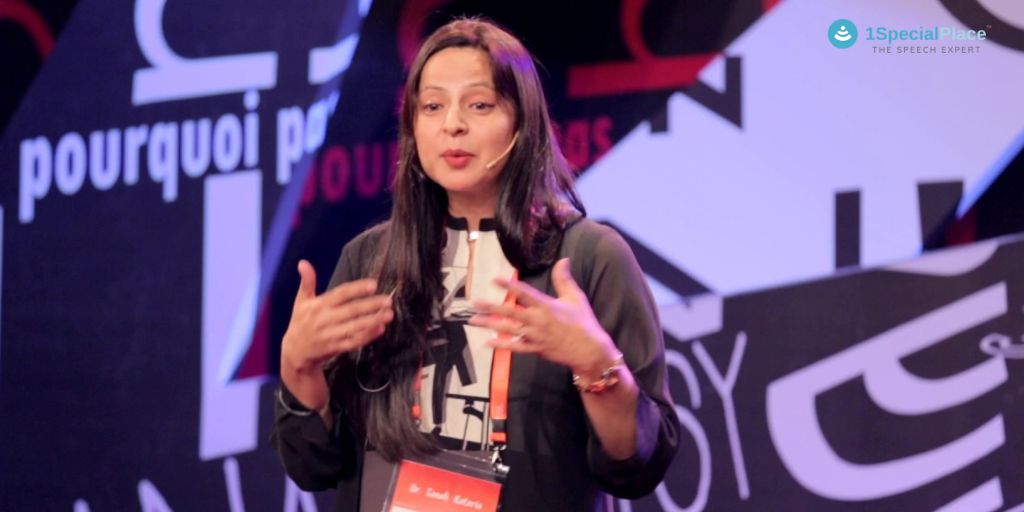
In Conversation With Dr. Sonali Kataria
In Conversation With Dr. Sonali Kataria
Next in our Wall of Fame series, we feature a ravishing doctor and a hands-on mom of two beautiful children-Dr. Sonali Kataria.
Please introduce yourself to our readers.
I am Dr Sonali Kataria. Currently, I am the founder and executive director of Sunrise Learning Foundation, a non-profit devoted to educating and training parents and children on the autism spectrum (and entire family in some cases).
Born and brought up in a family of doctors, my basic education is medical graduation, followed by an MD from AIIMS in Anatomy, with Neuroscience as my specialization. I was fortunate to have been able to do a series of professional trainings including the Son-Rise Program (USA), Stem cell Therapy project from University of Melbourne (AUS), several Teacher Training programs (in autism and related conditions) after my MD and residency, which helped me shape my present status of educational empowerment. Out of all the programs, the Son-Rise program was the most impactful, and powerful program, that pretty much changed the way of my being.
Now, I am a mother of two beautiful children: Poorab and Yuvraaj. Both of them are special in their own special ways. One has special needs and the other has extra special deeds. Whatever trainings I did, ultimately, I realized, my children are my best teachers.
How did the journey with Sunrise Learning begin?
When my first child was born, he clearly needed some “extra special” time and efforts. He was on the autism spectrum (a condition in which the child finds it difficult to stay connected with the environment and people around him, and has various challenges in several aspects of development, particularly interaction, communication and speech). I had completed a 6 years residency tenure at AIIMS by then and was a consultant at Maulana Azad Medical College at that time, and was teaching medical graduates. My everyday struggle to give my time and efforts to my work was getting tougher, and I felt I was not being able to give my passionate best to my profession. It was like riding two horses together.
My husband, an anesthesiologist, was actually trying his best to help me balance, despite the crazy work responsibilities, and was the strongest support he could be. I was literally driving all day long, either to and from work, or to and from different fancy therapies, with my little bundle called “autism” as everyone called him at that time.
My mother stepped in to offer courage, and gave me a little piece of the most beautiful advice ever, categorically
“Motherhood is your FIRST RIGHT and your FIRST DUTY…!! So enjoy the privilege, and do it with complete commitment”.
And that was when my new journey began. I found a new beauty in the world around me, in my child, Poorab, and I found a new ME.
The more I found myself, the better our connection grew. My child started opening up, and bonding with us. But he was still quiet. No words yet. Silence.
Very soon, I conceived again. Despite the words of caution given to me by everyone, including my family doctors and doctor friends, (that there are good chances of the second child having autism too, if the first one is on the autism spectrum), we wanted him, and went ahead to bring him into our lives. Addressing the fears of my family, I said, “We already have one beautiful child with autism, so if God wishes, we will have another beautiful child with autism. We are there to accept and enjoy whatever God has in store for us. And we will welcome His blessings with open arms.”
Yuvraaj came like a breath of fresh air. Yuvraaj broke the years of silence, by talking his way into our world and hearts. He started building little blocks of interaction and communication for Poorab. He entered Poorab’s bubble, like no one else could. Poorab found a whole new friend.
And this was the beginning of a beautiful love story, of a new Sunrise.
My inner forces urged me to take the next step. Towards a better world for children on the autism spectrum. For their clueless mothers and lost fathers. For parents who felt like autism is a horrible disease.
And Sunrise Learning came into being. Poorab means East (from where the sun rises), and Yuvraaj means the prince of new learnings. And that’s how my third baby SUNRISE LEARNING was born. And this is just the beginning. I hope we will go a long way.
What is your vision at Sunrise Learning?
Sunrise Learning helps to teach and train children on the autism spectrum, and helps their parents to empower themselves with better understanding of their children’s strengths, challenges, special needs, learning strategies and coping mechanisms. Sunrise conducts parents’ awareness and training programs throughout the year, to bridge the gap between ignorance and understanding, indifference and sensitivity, hopelessness and belief, and most importantly, between the mothers and their children with autism.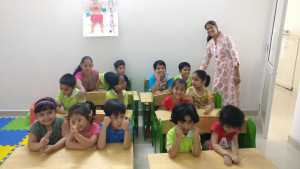
My vision for Sunrise Learning is to propagate the concept of Neurodiversity, an absolute acceptance of all kinds of different-minded and differently-abled people, and a complete inclusion of people with special needs into the society. I wish to create platforms of opportunities for them to learn and earn, and live a life of liberation and self-respect, in harmony with the rest of the “neurotypical” world.
Can you brief us on the work and the various programs carried out at Sunrise Learning?
Sunrise Learning provides school programs, educational and support services to children with autism and their parents, under the aegis of Sunrise Learning Foundation, that is registered as a trust.
In November 2014, we started Sunrise Learning as a Preschool. Soon, in May 2015, we got certified as an Early Learning Center for autism. A Sunrise Learning Sports Academy was registered with Special Olympics Bharat in July 2016. Our Pre-vocational program “Ican” started in September 2017.
We got certified as a Parents Training Center in January 2018. With God’s blessings, in August 2018, Vocational Training Courses have been started at Sunrise Learning for young adults with autism, to help them stead towards independence and dignity. We are in the process of collaborating with various companies to help our students find vocation.
Our school programs include: Early intervention, Sensory integration, sports classes, skill assessments, speech & language development, phonics, social skills training, communication skill development (through PECS and Avaz app), music and dance classes, computer skills programs, outdoor visits (picnics, eating-out, movies etc), night camps, pre-vocational skills program (to teach concepts of time, money, privacy, safety, danger awareness, gender, respect for authority etc), Vocational skills program (retail shop management, tailoring skills, computer courses, office skills course, creative production course, hospitality & house keeping course).
Our parents’ empowerment programs include: counselling sessions, training workshops for parents, Mom & Child programs, certificate courses etc.
What is your typical day at work?
I start my day at work with my children, in the school assembly. The morning sounds of the Gayatri Mantra and “We shall overcome” in the school prayer time, give me the energy and the strength to live each day to the fullest. Soon after, I go around the school premises for a safety check, and check all CCTV cameras. Right after, I meet the Sunrise team, the teachers, who form the driving force of the Sunrise mission. I help them feel motivated and inspired by throwing light on the subtle strengths of the children and discuss all possible signs of progress in the students.
That discussion leaves them hungry for exploring more strengths and searching for more signs of progress, rather than focusing on the weaknesses and little failures.
Soon after, I sit with the little students, in their classes, and try to see the classroom world through their innocent eyes, and try to understand their perspective, each day, trying to learn something from them. So that I can give that viewpoint to the teachers, for them to understand the children better.
The rest of the day flies through from a cup of tea during the lunch break, some individual student sessions and assessments (to look for progress, excellence and promotions…!!), a few parents’ counselling sessions (to bring in acceptance, to help them accept the child for who he is, and love him for his whole self, along with his autism) and responding to a few parents’ emails.
I wind up my work day with a discussion meeting with the caregivers of the school, the didis and staff. They form the backbone of the child support system, and they need to be trained, counselled and filled with a sense of pride, joy and enthusiasm for what they do, each day, to be able to give their best.
Can you share a few inspirational experiences while working with parents with Autism Spectrum Disorders?
There are several touching experiences each day, with mothers and children from various walks of life. However, 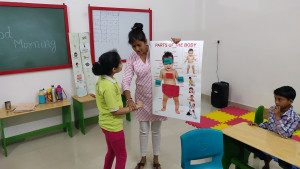 there is one particularly extremely soul-stirring encounter with a mother, who had come to us for a Mom and Child Program, from a small town in UP. After the 1.5 month program finished, on the farewell day, we were discussing each mother’s unique experiences. She gathered the courage to tell us in a shaky voice that she had actually come from her home town, with her child, to end their lives here.
there is one particularly extremely soul-stirring encounter with a mother, who had come to us for a Mom and Child Program, from a small town in UP. After the 1.5 month program finished, on the farewell day, we were discussing each mother’s unique experiences. She gathered the courage to tell us in a shaky voice that she had actually come from her home town, with her child, to end their lives here.
She had planned to come out from her unaccepting home, on the pretext of doing this Training program, and she had planned to commit suicide here. But as the Mom & Child program progressed, she found new hope, and experienced a certain new kind of acceptance for her child. And today, she wanted to scream from the roof top and tell the whole world that
“she is proud of her child, and his autism”.
And she is willing to go all the way, , to help him find his true potential. That moment has inspired me, to always try to give my best at every possible opportunity to empower a parent.
What are your personal perspectives and insights into ‘Autism Spectrum Disorders”?
There are several research projects that are already directed towards finding the cause (and cure) of this condition called autism. And the ongoing endeavours would soon give us breakthrough understanding of this condition. As of now, as parents and educators, we really need to focus on what we already know, and giving our best to provide “tools” for helping each child to be able to perform to his best potential. So just like I have found a “tool” to help my vison, we need to focus our energies on helping our children to find their tools for functioning independently and “normally”.
We can help them use “good routines”, organization and structure (of physical space, time and activities), schedules, visual supports. Several such amazingly useful tools to help them find their way towards independence and dignity.
As a doctor, I believe that autism stems from the gut. I believe in possibilities of several pathogens/ toxins/ entities in the gut, that bring about failures in digestion/ assimilation/ metabolism of certain nutrients.
Such conditions lead to
- metabolism failure (metabolism being a primary function of mitochondria)
- Giving rise to immuno-inflammatory pathways in the brain
- Causing slowing down (blockages) of the pathways connecting the receptive (sensory) centers to the expressive (motor) centers, thus giving rise to symptoms of disconnect.
However, since the exact pathway is not understood completely yet, its best to make the best of the time in hand and the neuro-adaptability in the young brains, by giving them enriched social environments, and a possibly toxin/chemical/junk free diet.
I have also, for several years, studied the good effects of physical exercise and body movements on the functioning of the brain. It is a clear and well-established fact that physical exercise produces several neurotrophic factors in the brain (BDNF) and “happy chemicals” that result in increased synaptogenesis (more connections) between the neuronal networks, thus increasing the adaptability of the brain to learn more, focus more on the task at hand, filter out irrelevant information (distractions) and perform better in expressive functions.
Therefore, there is a huge role of gross motor activities such as:
- Sports
- Brain Gym exercises
- Aerobics
- Movement breaks
- Sensory-motor games
- Eye-hand coordination activities
- Dance imitation
- and other such activities in managing children with autism
which sometimes gets under-estimated in importance, as compared to the other traditional therapy forms.
How do you think Autism is perceived in society and what do you think is the way forward?
Autism is seen as just another mental condition, believing that a child who is withdrawn, disconnected and quiet, has no “mind of his own”, no thought processes, no feelings and no understanding of his environment or spoken language. Most people perhaps believe that since they are quiet, or lost in their own world, or singing to themselves, they probably have nothing to say and nothing to understand. Sadly, screaming and tantruming autistics are easily labeled as spoilt, badly parented brats. Mothers are judged as being cold and “too busy for their children” mothers.
The way forward is awareness. Information about autism, and understanding about the basic wiring of the autistic brain, can become a beautiful bridge towards acceptance and inclusion.
Can you please share with us some important lessons that you have learnt over time, in working with children with ASD?
Kids are the most innocent souls in this universe. They take things literally. Childrens will never ever make fun of others. Its not in their system. Kids never ever judge a “work” or a job as being menial. Childrens don’t have any such discrimination in their system.
Kids can happily mop the floor, and clean the toilets, if they find their calling there. They don’t understand sarcasm and never indulge in gossip, rumor mongering or teasing. Again, its not in their system.
Working with people on the autism spectrum has been an enriching experience, coz they have helped us become better human beings. When we work with people who are on the autism spectrum, we really need to remember to “respect our words”, to make commitments that we know, we can keep for sure. We have to ensure that we keep all our promises.
We also need to make sure that we give clarity in whatever expectations we have from them, and also set clear consequences for them. Autistics are people of words. They take each word literally.
Tips or messages that you would like to share with other parents and caregivers of differently abled children and individuals.
Never underestimate a child just because he is not looking at you, speaking, or trying to impress or please you. He is way more capable, than he is able to express or flaunt or brag about.
That child finds it difficult to multi-task, and therefore, when he is trying to listen to you and focus on the words, he may not look at you in the eye. So, please do not force eye contact. Let the eye-contact be a spontaneous and natural act.
If you are an entrepreneur, who wishes to have a great workforce of employees, and you have work that can perhaps interest a person with autism, then an autistic person is the best employee for you.
- Autistic employees do not gossip,
- can focus on the minute details
- can keep doing the same kind of work for hours and hours without getting bored
- do not get pissed off by sarcastic remarks
- nor do they make any
- they can do amazingly brilliant jobs at visual tasks
- they don’t care whether it’s a low profile job
or people look down upon it, and they never throw loose comments or vague commitments. They know how to keep your word.
So next time, when you meet a person with autism, look beyond the lost, disconnected child. See the beauty of the human being in there, who is waiting to be accepted for who he is, and included with all of you, in this very world. And once you understand their world, you would probably love to be included in their world. And they will be happy to welcome you. So, welcome to autismland..!!
Truly an inspiration for many, Dr. Sonali has proved perseverance and determination goes a long way and creates wonders. For parents of young children, knowing when to screen for possibility of Autism is important. Article further describes the responses.
When a professional informs you that your child has autism spectrum disorder, it may be a new term to you. Many autistic people will also greatly benefit from using Augmentative and Alternative Communication (AAC). Since autism is a developmental disorder its behavioural manifestations vary with age ability.
This is because Autistic people need access to extra support, care, and government aid. Since each person with Autism is unique, their need for support also varies. Autism has previously been connected to emotional, physical, environmental, and health-related deficits. Hence, when they are considered as disabled, it is to protect them from this vulnerability. There are many options available, but be mindful of what you choose! We, at 1SpecialPlace wish Dr. Sonali and her beautiful family at Sunrise Learning Centre all the very best for all their future endeavors!
When you have excellent speech and language, you can fully express yourself and connect with people.
- Chandrakant Vishwakarma helping the world hear better! - May 8, 2019
- Candid with Bhanu Gupta - September 29, 2018
- In Conversation With Dr. Sonali Kataria - September 26, 2018

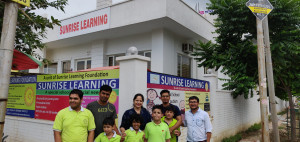

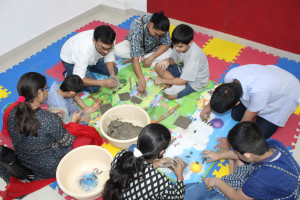
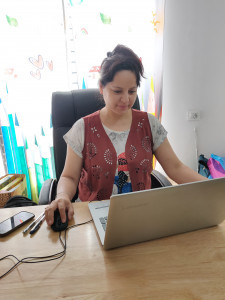
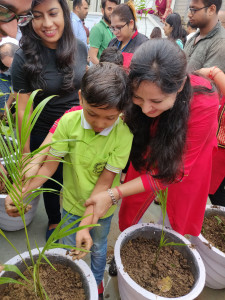
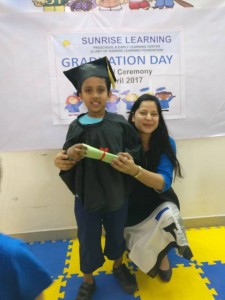
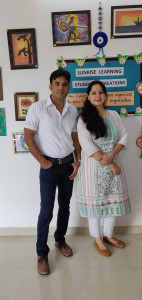
Leave a Comment
(2 Comments)
Program information
Pl give me her contact no urgently
Categories
Recent Posts